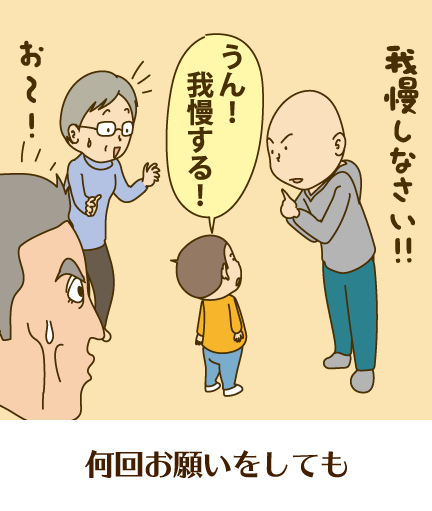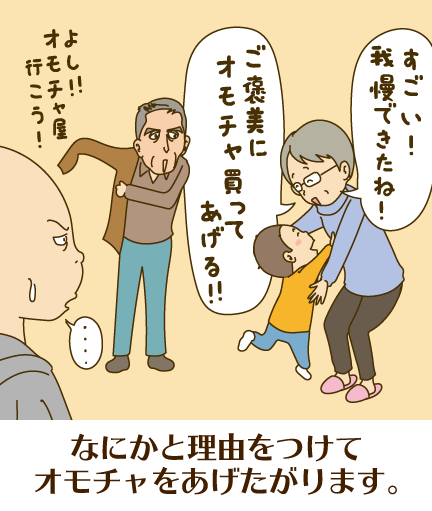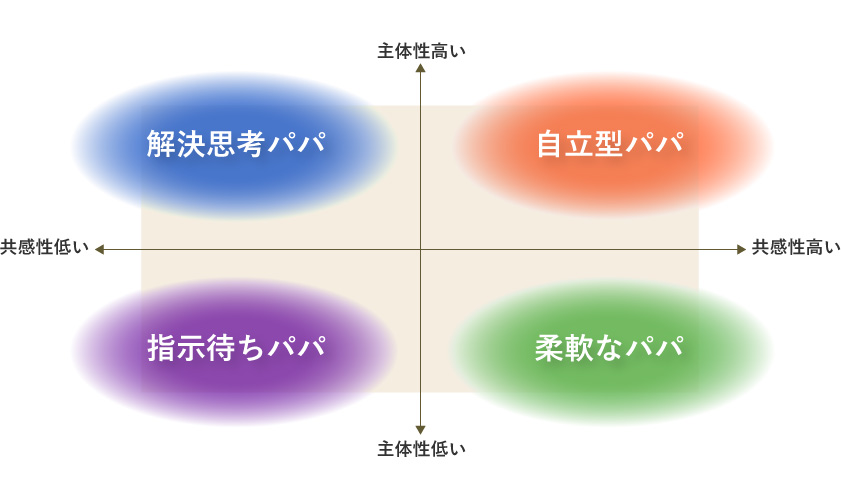Table of Contents
- Parenting Manga “Whatever the Reason, Grandma and Grandpa”
- <Practice> Understanding and sympathy of wives, advice and support of parents
Parenting Manga “Whatever the Reason, Grandma and Grandpa”





Profile
Eiichi
After working for a design company in Tokyo, he became a freelance illustrator. He is a hard-working father who creates animation, manga, and illustrations, including winning the Yubari International Fantastic Film Festival’s International Short Film Showcase Division Excellence in Animation Award.
<Practice> Understanding and sympathy of wives, advice and support of parents
Dad wants to hear it right!
Why is mom grumpy about housework and childcare?
Mom is grumpy even though she thinks she is doing a good job of housework and childcare–. Naomi Yamamoto of the NPO Child Rearing Study Association, who has counseled many couples, says, “Many fathers’ problems are that their mothers are grumpy when it comes to housework and childcare. We asked Ms. Yamamoto why moms are so grumpy.
Are you an independent dad or a dad waiting for instructions?
Successful housework and childcare as a couple requires both “initiative” and “empathy. The matrix below was created with independence on the vertical axis and empathy for mom and family on the horizontal axis. Independent fathers” with high levels of both initiative and empathy are common among those who have studied abroad, and are gradually increasing in number. Still more common are “instruction-waiting dads” with low initiative and empathy. This is the type of father who is willing to do housework and childcare, but does not know how to do it. The “flexible father” with high empathy but low initiative is the type that says, “I’m sorry you had a hard time,” or “I’m sorry you had a hard time,” but doesn’t make any moves on his own. Both of these fathers are very attentive to their mothers.
They are willing to do it, but they won’t, or they put on a friendly face, but they won’t. This is the source of frustration for moms. Also troublesome are “solution-thinking dads” who are highly proactive and have little empathy, and they may say, “Just do this,” or “I’ll do it,” and do it without asking the other person’s intentions. That may be another reason for making Mom unhappy.
Many dads don’t know which type they are. They irritate mom because what they think they are and what they see from the other person are out of sync. To make mom smile, the couple needs to be in sync with each other.
Japanese men tend to be less empathetic than women. Women can talk for hours over a cup of tea, saying, “I know what you mean! and can talk for hours over a cup of tea, but many men cannot.
One study that examined how 4-year-old boys and girls develop cooperation in groups noted that girls tend to make friends by saying, “Your hair looks so cute,” and sympathizing with each other, while boys tend to form groups by playing and taking other actions.
As the children grow up, mom wants to face her fears and think more concretely about education and future plans. At that time, if dad is vague and says, “That’s fine,” without empathy, mom gets annoyed.
Unlike in the past, we can get a lot of information now, and on the other hand, it is hard for mothers to decide what is good for them and what they want. That’s where I want to consult with them, but my husband is too lazy to do so. Dads also tackle it properly if it’s their job, because their roles are clear. This is where family meetings become important.
Hold a family meeting to determine the division of roles.
It is not uncommon for couples to fall out of favor when they begin raising children. They become busier, have fewer opportunities to talk, and their views of the other person change, such as the fact that they used to think they could rely on each other to make decisions about various things, but now they seem selfish.
It is important that we have an opportunity to rub each other’s faces together, and the family meeting is a good opportunity to do so.
- (1) Discuss and decide on a play schedule and what the family values.
- (2) Look back on the previous month and organize what was done and what was not done.
- (3) Schedule the next regular family meeting.
Regular monthly meetings are held to confirm the division of household chores and childcare responsibilities and to discuss events and plans. It is easy to forget to tell them about work, but if you say something like, “I’m going to be busy with work next month, so I’m afraid I’m going to put a strain on you,” they will not be caught unawares.
Also, write down what you all want to take care of as a family this month; after a month, look back and make your next plans and goals. For example, it is also important to make a column on the calendar for writing down appointments and to take time to say “thank you” to each other for this month.

If you say thank you, the other person will thank you back. Thank you is like a medicine that makes a couple fair. It is important to use it consciously.
When the housework and childcare is left to mom, she wants to do what she thinks is best. So they are often frustrated that they cannot do as they wish. However, it is important for couples to be aware of the importance of a fair relationship. If mom can say, “I appreciated this part, but I want you to do this part,” the relationship will begin to take off. It is also important for the father to think about what he can do and act on his own without looking at the mother’s face.

Profile
Naomi Yamamoto (Chairman, NPO Association for Child Rearing Studies)
Graduated from Japan Women’s University with a Master’s degree in Home Economics. After working as a kindergarten teacher, established I.S.C. Inc. in 1995 and opened “Little Pals,” a classroom for parents and children, as a place to practice her educational philosophy. He is a child and family consultant.
http://kosodategaku.jp/yamamoto-speech/
A must-see for moms!
The “magic words” that make dads want to do childcare and housework
Even if you talk to your father straightforwardly about the division of housework and childcare, it is difficult for him to take you seriously. Many mothers must have such problems. We asked Yuko Kobayakawa, a “negotiation trainer” who teaches everyday negotiation skills, for tips on how to successfully discuss the division of housework and childcare with your father with a smile on both sides.
Start by building a good relationship.
For smooth discussions, it is very important to have a good relationship with the other party before entering into negotiations. In many cases, when husbands say, “I want to talk about the division of housework and childcare,” they often get defensive, saying, “This is going to be a troublesome discussion. The reason for this is that they feel that there is no benefit for them even if they discuss it, or that the other party will make one-sided demands of them.
If the husband feels that way from the beginning, it is difficult to have a good outcome for both parties. So, first of all, before negotiations, it is necessary to make preliminary preparations to gradually improve the couple’s relationship and build mutual trust. In fact, rather than the negotiations themselves, the outcome will differ greatly depending on whether this preparation has been done properly.
What are the magic words that lead to win-win negotiations?
The point at which two people negotiating can be happy with each other is a win-win, i.e., both people can feel the benefits. It is the magic words “I am glad I married you” that create a relationship in which you feel that you are the partner with whom such negotiations can take place.
While words of gratitude such as “thank you” and “you’re very helpful” are effective in improving the relationship, “I’m glad I married you” are the strongest words of all.
It may be hard to say at first, but try it out and keep saying these words to your husband for a week. At first, your husband will look at you suspiciously and say, “What’s wrong? but eventually his attitude will change.
Then, once again, it is important to confirm that the discussion is not a battleground for your advantage, but a win-win situation where both parties can be happier.
Discussions that make both parties happy.
The following four skills are useful when discussing the division of housework and childcare with a husband.
- 1. visualization
List tasks and problems in an easy-to-understand manner using tables and diagrams.
- (2) Work
Explain and express your wishes in a calm and unemotional manner. State your conclusion, give three reasons, one of which is – and so on.
- 3. gamification
If you look at the task of housekeeping and childcare as a game of Othello or other game of camp, it is easy to feel like you want to win the game.
- 4. heroization
“Protect those you love!” It is also useful to make people feel like heroes.
It is especially recommended to use a chart such as an organization chart to classify and visualize the chores, or to play an Othello game style to fight over who gets more chores done, as it is easier for men to commit to “doing it themselves”. Such diagrams and charts should also be easy to achieve good results if you work collaboratively from the point of creating them together.
It is also important to wait and see how the other party responds without getting emotional. This is an essential negotiating skill to obtain a good result.
In order for both spouses to be happy by talking things out, the basic premise is that there is love and trust for each other. Although some people may be embarrassed to admit it at this point, just by expressing affection in a positive manner, even if it is only in words at first, a couple can improve their relationship and find solutions to their dissatisfaction with housework and childcare. Expressions of affection are the strongest bargaining weapon.

Profile
Yuko Kobayakawa, CEO and President, Work Shift Institute, Inc.
Certified Case Method Instructor, Keio University Business School Case Method Teaching Methodology Research and Extension Office. He holds a Master of Business Administration from Keio University Graduate School of Business Administration and an MBA from Columbia Business School in the U.S. He has worked for a foreign financial institution for a total of 13 years. Worked for a foreign financial institution for a total of 13 years. After the birth of her second child, she started her own business as a consultant and seminar lecturer, and is the mother of three children.
https://workshift.co.jp/
episode
What Gramma and Grampa have done for me.
Mr. and Mrs. Takashi and Yumi (pseudonym) have their parents living in Shiga helping them with their daily meals. How do they do it when they live so far away? We asked them for their ideas.

Both parents work together and both parents live far away. Their usual social contact is limited to talking on the phone. When the child is ill and needs a few days to recover, or when the father goes abroad on business, the mother’s grandmother sometimes comes to Tokyo.
 Delicious homemade side dishes from Shiga
Delicious homemade side dishes from Shiga
Takashi and Yumi’s family ask their wife’s parents to send them a bi-weekly package of prepared meals for about eight weekdays. The book “Frozen Delivered Gohan” (written by Junko Ueda, Kodansha), which Yumi happened to have in her possession, was the inspiration for the idea. The book is a collection of recipes for sending frozen meals to parents and children who live far away from each other via cool takkyubin.
We are both working, and our days are hectic, but we wanted to feed our children safe and delicious food, and to reduce cooking time as much as possible in the limited time we have in the evenings and at night.
The couple’s approach to sharing housework and childcare is for both spouses to have one or two days a week without overtime work, and the one without overtime work takes care of the children on those days.
On days when my wife works overtime, I take care of the kids from pick-up to bedtime. I often bring work home with me. Of course, I also check homework and make dinner that day. It is natural for me to share the responsibility. I am in charge of breakfast, and I also do the dishes and laundry on behalf of my wife, whose skin tends to be rough. I would like to share more of the responsibility, but since I work until almost the last train except for the days I pick up the children, it is difficult to share more than this.
The housekeeping service was sent off to accommodate Takashi’s dislike of having strangers in the house. Yumi tries home-delivery short cooking kits and make-ahead recipes, but she gets bored with them each time and they do not reduce her time burden much.
I knew that my wife was concerned about the children’s food and was making a lot of attempts. Of course, I appreciate it, but since we both work, there are some things I want to do but can’t, and I don’t think I need to try too hard during the weekdays. On the days I am in charge of meals, I make them with the idea that they should have a balance of vegetables, meat or fish, and carbohydrates. When it is hard, I eat out at a family restaurant.
Outside help for weekday co-workers
In this situation, Yumi found a way to have frozen side dishes delivered by her parents.
I can eat delicious and safe homemade food with my children. Moreover, for me, it is a nostalgic taste of my hometown.
I discussed this with my parents just as my father was retiring. I thought that having my parents help me prepare our meals would give them a sense of purpose and help them stay healthy. I thought it would be a good way for them to keep their energy up.
During the week, my wife and I are in no condition to work any harder, so when I heard her suggestion, I thought it was a natural step to ask for outside help. But I don’t like people from outside coming into my house, so being able to ask my parents for help was helpful in that sense.
This system started without any consultation with me (laughs), but it was the best way for my wife, because her own parents are easier to consult with and the food they send us is delicious.
The joyful faces of grandchildren make Gramma and Grampa’s work worthwhile.
The main dishes that are sent frozen are the main dishes. On the day of the meal, you can heat them up and add miso soup or salad. If there is leftover stock, you can ask them to adjust the pace at which they send the dishes.
We also pay gratuities (including courier fees) to the parents.
Because we are paying for the food, there is no hesitation on both sides, and we can make requests such as, “This is the kind of food I want! We are able to make requests, and my parents are able to say, “I would like to change the schedule.
When the children say, “Grandma and grandpa made this,” they are delighted and say, “Wow, it’s amazing! It’s delicious! Grandparents are usually hard to meet, but it seems to be an opportunity for them to feel closer to their grandparents in their daily lives. The grandparents also find it rewarding, saying, “I am most happy when my grandchildren are happy.
Don’t forget to thank your grandparents for their words and attitude.
The “frozen side dishes” from my parents are full of benefits for my family. Yumi says that she usually tries to shower them with words of gratitude. She is especially pleased when her children tell her what they think of the food, so she calls or e-mails them immediately.
It is also important to immediately ask about anything that you think may be a burden. On the other hand, we also try to convey our requests in a “please don’t hold back” tone of voice. We try to build a relationship with them so that they are always willing to cooperate with us, for example, by taking their parents’ lives into consideration and covering their travel expenses when they have to come to Tokyo because of their children’s illnesses.
Although my wife is the one who communicates directly with her parents, I also try to express my gratitude to them. When I travel abroad, I always buy souvenirs for my wife’s parents to show my appreciation. We have smart speakers at home and at my parents’ house so that we can easily make video calls. That kind of follow-up is my role.
Strategically organized to “earn,” “grow,” and “do housework.”
Marriage is moving from a “division of labor” to a “partnership” type of marriage.
Based on the manga of the same name, the TV drama “Runaway is Shameful but Useful (Hanare wa Shameful but Useful)” was a big hit in 2016. Mikuri Moriyama, who has been cut off from her temporary job, ends up working as a domestic helper at the home of company employee Hiramasa Tsuzaki. Later, when she has pressing life circumstances, Mikuri proposes a “contract marriage” to Hiramasa, in which she lives in the house and signs an employment contract with him. As they continue to live together and continue their employer-employee relationship, they eventually develop romantic feelings for each other. The amazing thing about “Runaway” is that it clearly converted the “economic value of free labor,” which has been ignored even in economics, into monetary value.
To begin the contractual marriage, Hiramasa offered Mikuri a salary of 194,000 yen per month. This amount is based on the “opportunity cost method. Opportunity cost is an economics term that refers to the amount of income lost due to lost opportunities. In other words, it is the amount of income that Mikuri would have earned if she had worked outside the home for the time she was doing housework. Mikuri is contracted to work 7 hours a day, 2 days off per week, so the calculation is 140 hours per month x 1,383 yen = 193,620 yen. However, since the rent, food, and utilities that the two share are deducted from this amount, the actual money available is about 90,000 yen.
When we calculated how much income a husband needs to pay this “full-time housewife salary,” we found that it is established at more than 6 million yen; if it is less than 6 million yen, the full-time housewife is being “exploited* of her likes,” as they say in “Runaway. In addition, the opportunity cost is even higher once children are born. According to a 2011 survey by the Ministry of Health, Labor and Welfare, full-time housewives in households with preschool children work 61.7 hours per week, and the “salary” they should receive is 371,336 yen. In order to pay this compensation, what would be required is an annual income of more than 12 million yen. Even if that annual income were available, this working time is equivalent to working 80 hours of overtime per month, which does not mean that the wife should be allowed to work as a one-person operation.
*Liking exploitation: not paying for labor because you like it.
Then, what about the case of a dual-income family? For example, if the wife earns 4 million yen a year and the husband earns 6 million yen a year, their combined income is 10 million yen, so a simple calculation shows that the husband should bear 40% of the housework. But in reality, there are many cases where the wife says, “I have shorter hours and a lower annual income than you, and I do most of the housework and childcare.
Marriage is not worth it at all from a woman’s point of view, as long as we have a traditional division of roles. I think it is very important to recognize that first.
In my opinion, the future of marriage needs to be a “joint management” type of marriage. For men, in order to take advantage of the economies of scale of being two people, the probability of doubling the family income is much higher if they support their wives and help them keep their jobs, even if it means cutting back on their work hours, rather than doubling their current salaries. When I give lectures at universities, I simply say to male students, “Just by supporting your wife as best you can so that she doesn’t stop working, your overall household income will change by 100 to 200 million,” and they are all immensely impressed.
In today’s unstable work environment, the Showa-style division of labor, in which only one person is responsible for earning money and the other for housework and childcare, has become extremely risky. In the 10 years since the bursting of the bubble economy, Japanese people’s salaries have fallen completely, and the wage structure has changed. Even if you work for a company for a long time, your salary does not increase steadily. That is why sometimes husbands save their working hours to support their wives who are going to graduate school to advance their careers. If we are conscious of earning as a team and raising children as a team, we can proceed as if we are running a business together, flexibly exchanging what we do. Since the situation changes daily, we have a “management meeting” about once a week to discuss money and issues that need to be resolved. Strategically assembling “earning,” “raising children,” and “doing housework” from the perspective of “which of the two of us should do this now?” will lead to increased savings and peace of mind in retirement.
This is not to say that housework must always be done or that it should be shared 50-50. We are looking for a mutually satisfactory form after properly recognizing the value of unpaid housework and childcare. As a result, they may decide to outsource the work, or they may say that they should be rewarded financially for their share of the burden. It may be that just talking it over is fine. It is up to each person there. Getting help from a variety of people, such as grandparents who live nearby, daycare centers, family support centers, etc., can also lead to economies of scale.
When considering team earning and team childcare, the issue of work styles is also a major factor. Even if men’s awareness changes, they will not be able to participate in housework and childcare if the way they work at their companies does not change. In fact, data shows that when a complete telework system is introduced at the husband’s company, the husband’s time for housework and childcare increases by 30 minutes a day. Reforming the way we work is reforming the way we live. If the way we work changes, the way we live will also change.
Shirakawa Toko
Journalist and author on the declining birthrate. Visiting professor at Sagami Women’s University and Showa Women’s University. She is a visiting researcher at the Interfaculty Initiative in Information Studies, Graduate School of Interdisciplinary Information Studies, University of Tokyo, a member of the Specialist Committee on Priority Policies, Council for Gender Equality, Gender Bureau, Cabinet Office, and an expert member of the “Working Style Reform Conference” and “100 Million Vitalization National Council,” Cabinet Secretariat. In addition to “Kekkonkatsu Jidai” (coauthored by Masahiro Yamada), which triggered the marriage activity boom, he is also the author of “Kekkonkatsu Keizaigaku” (“The Economics of Marriage as Seen in ‘Runaway Shame'”), “Your Company’s Working Method Reform, Here is Wrong! and “Your Company’s Workplace Reform: Here’s What’s Wrong!
















